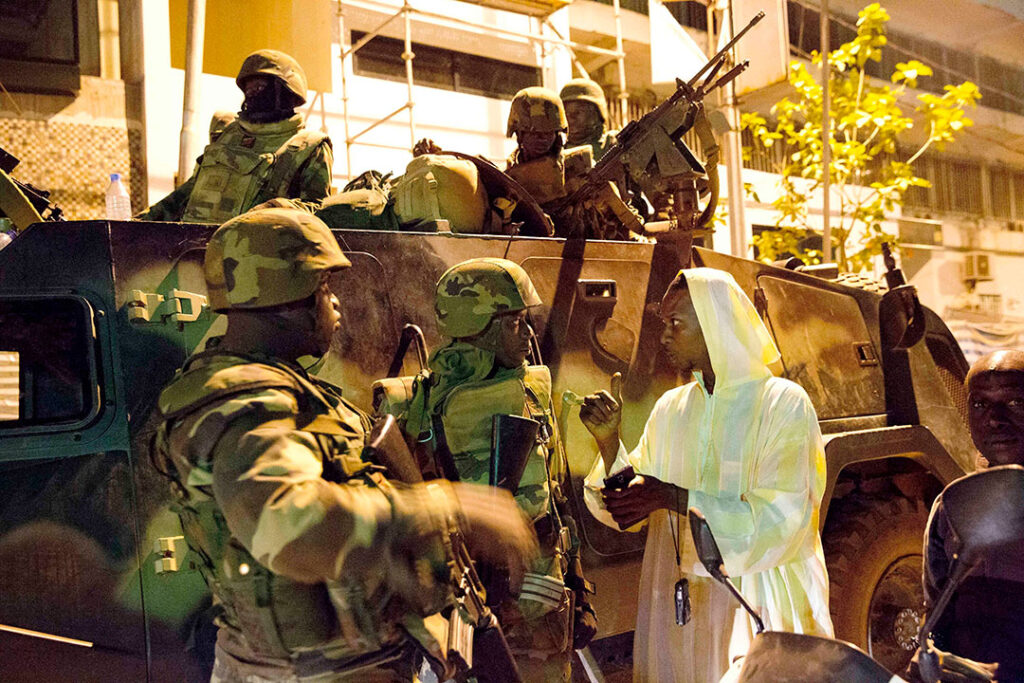As terrorism-related violence in the Sahel increasingly moves toward coastal West Africa, an economic bloc of West African countries announced plans to activate a 260,000-strong counterterrorism force with an annual $2.5 billion budget.
Omar Touray, president of the Economic Community of West Africa States (ECOWAS) Commission, announced on August 25 that the rapid deployment force will provide logistics to frontline states.
“This bold initiative has become necessary given the asymmetric security dynamics in our region,” Touray said in a report by Nigerian online newspaper The Cable. “We are conscious of the fact that this requires the necessary financial resources and capabilities to make it a reality. ECOWAS is therefore throwing the gauntlet to bilateral and multilateral partners to complement this daring regional effort.”
ECOWAS also has committed to deploying 1,650 military personnel in 2026 as part of its Standby Force. The Standby Force is part of a broader regional security strategy aimed at curbing terrorism and cross-border crimes. Touray urged the African Union and the United Nations to support regional counterterrorism operations. He also acknowledged that the region is rife with other crimes.
“The war economy fueled by illegal mining and illicit taxation is also worsening insecurity,” he said in The Cable report.
Considered the epicenter of global terrorism, the Sahel accounts for more than half of all terrorism-related deaths globally, according to the Global Terrorism Index, which reported that terror-related deaths in the region have increased tenfold since 2019.
The al-Qaida-affiliated Jama’at Nusrat al-Islam wal-Muslimin (JNIM) and the Islamic State Sahel Province (ISSP) terror groups, in particular, have steadily expanded their operations southward and westward. Héni Nsaibia, senior analyst for West Africa at the Armed Conflict Location & Event Data Project (ACLED), noted they are targeting border regions between Benin, Niger and Nigeria, where security forces are overstretched and civilians are increasingly exposed to violence.
“JNIM and ISSP’s investment in cross-border activities suggests that this border region is of growing importance for jihadist expansion,” Nsaibia wrote. “The groups have been exploiting the porous borders to entrench their presence and further their goals of establishing proto-states, but also to complicate military efforts to contain their areas of operation.”
Violence in northern Benin reached its worst on April 17 when JNIM killed at least 54 Beninese Soldiers in a major double attack against military positions at in the W National Park, near the Burkina Faso border. It was the deadliest single day of fighting since violence began spreading into Benin in 2019. A similar JNIM assault killed at least 34 Soldiers in the same area in January.
In Togo, Benin’s western neighbor, JNIM killed at least 54 civilians and eight soldiers in 15 attacks between January and July. Robert Dussey, Togo’s foreign minister, told Reuters the terrorists attacked in northern Togo, near Burkina Faso.
According to the Global Center for the Responsibility to Protect, bandits or insurgents killed at least 2,266 people in Nigeria during the first half of 2025, surpassing the total number of such deaths in all of 2024. Boko Haram and the Islamic State West Africa Province (ISWAP) have increased attacks against civilians and security forces in Nigeria, especially in Yobe State, which borders Niger, and Borno State, which borders Cameroon, Chad and Niger.
During assaults on May 12 and 13, ISWAP militants seized the Nigerian town of Marte and abducted several Soldiers, reinforcing their foothold along Lake Chad smuggling routes. A suicide bomber on June 20 killed at least 10 people and injured several others in Borno. Terrorists often attack areas in Benin, Niger and Nigeria where security forces are less present. Analysts say this why the success of the new ECOWAS counterterrorism force is critical.
“These challenges recognize no borders,” Nigerian Chief of Defense Staff Gen. Christopher Musa said in a report by Nigeria’s This Day Live newspaper. “They are resilient and demand a response that is equally dynamic, unified, and strategic.”
The new ECOWAS force should have a dedicated regional headquarters, standard training protocols and clear rules of engagement if it is to succeed, according to Fidel Amakye Owusu, an international relations and security analyst. Writing for thehibarinetwook.com, Owusu said that Côte d’Ivoire and Nigeria will need to assume a greater share of the force’s financial and logistical responsibilities and that civilian oversight is necessary to maintain democratic legitimacy.
“West Africa stands at a crossroads,” Owusu wrote. “The threat of terrorism is evolving faster than ever. The question is no longer whether Africa can defend itself — but whether it can finally unite to do so. This new military initiative may be the best chance yet to answer that question in the affirmative.”

